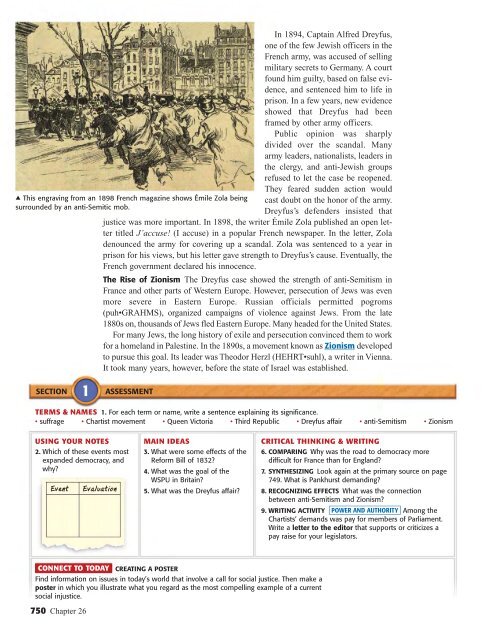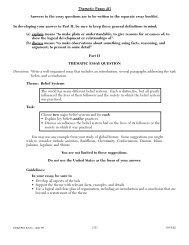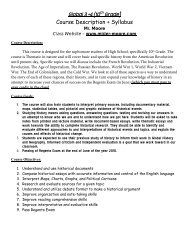The Industrial Revolution, 1700– 1900 Previewing Main Ideas
The Industrial Revolution, 1700– 1900 Previewing Main Ideas
The Industrial Revolution, 1700– 1900 Previewing Main Ideas
You also want an ePaper? Increase the reach of your titles
YUMPU automatically turns print PDFs into web optimized ePapers that Google loves.
SECTION 1 ASSESSMENT<br />
750 Chapter 26<br />
In 1894, Captain Alfred Dreyfus,<br />
one of the few Jewish officers in the<br />
French army, was accused of selling<br />
military secrets to Germany. A court<br />
found him guilty, based on false evidence,<br />
and sentenced him to life in<br />
prison. In a few years, new evidence<br />
showed that Dreyfus had been<br />
framed by other army officers.<br />
Public opinion was sharply<br />
divided over the scandal. Many<br />
army leaders, nationalists, leaders in<br />
the clergy, and anti-Jewish groups<br />
refused to let the case be reopened.<br />
<strong>The</strong>y feared sudden action would<br />
cast doubt on the honor of the army.<br />
Dreyfus’s defenders insisted that<br />
justice was more important. In 1898, the writer Émile Zola published an open letter<br />
titled J’accuse! (I accuse) in a popular French newspaper. In the letter, Zola<br />
denounced the army for covering up a scandal. Zola was sentenced to a year in<br />
prison for his views, but his letter gave strength to Dreyfus’s cause. Eventually, the<br />
French government declared his innocence.<br />
▲ This engraving from an 1898 French magazine shows Émile Zola being<br />
surrounded by an anti-Semitic mob.<br />
<strong>The</strong> Rise of Zionism <strong>The</strong> Dreyfus case showed the strength of anti-Semitism in<br />
France and other parts of Western Europe. However, persecution of Jews was even<br />
more severe in Eastern Europe. Russian officials permitted pogroms<br />
(puh•GRAHMS), organized campaigns of violence against Jews. From the late<br />
1880s on, thousands of Jews fled Eastern Europe. Many headed for the United States.<br />
For many Jews, the long history of exile and persecution convinced them to work<br />
for a homeland in Palestine. In the 1890s, a movement known as Zionism developed<br />
to pursue this goal. Its leader was <strong>The</strong>odor Herzl (HEHRT•suhl), a writer in Vienna.<br />
It took many years, however, before the state of Israel was established.<br />
TERMS & NAMES 1. For each term or name, write a sentence explaining its significance.<br />
• suffrage • Chartist movement • Queen Victoria • Third Republic • Dreyfus affair • anti-Semitism • Zionism<br />
USING YOUR NOTES<br />
2. Which of these events most<br />
expanded democracy, and<br />
why?<br />
Event Evaluation<br />
MAIN IDEAS<br />
3. What were some effects of the<br />
Reform Bill of 1832?<br />
4. What was the goal of the<br />
WSPU in Britain?<br />
5. What was the Dreyfus affair?<br />
CONNECT TO TODAY<br />
CREATING A POSTER<br />
Find information on issues in today’s world that involve a call for social justice. <strong>The</strong>n make a<br />
poster in which you illustrate what you regard as the most compelling example of a current<br />
social injustice.<br />
CRITICAL THINKING & WRITING<br />
6. COMPARING Why was the road to democracy more<br />
difficult for France than for England?<br />
7. SYNTHESIZING Look again at the primary source on page<br />
749. What is Pankhurst demanding?<br />
8. RECOGNIZING EFFECTS What was the connection<br />
between anti-Semitism and Zionism?<br />
9. WRITING ACTIVITY POWER AND AUTHORITY Among the<br />
Chartists’ demands was pay for members of Parliament.<br />
Write a letter to the editor that supports or criticizes a<br />
pay raise for your legislators.
















